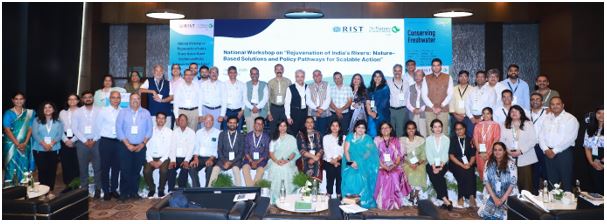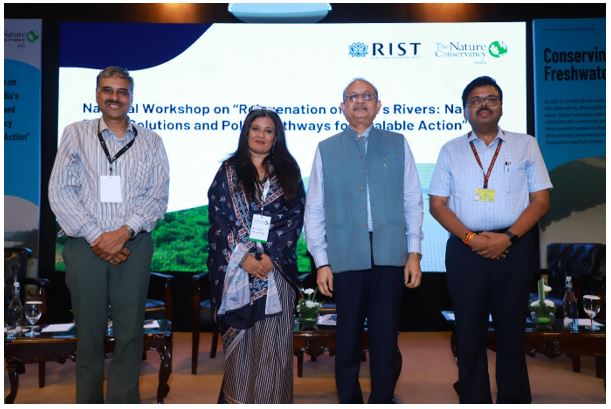Revitalizing India’s Rivers: Nature-Based Solutions and Policy Approaches for Scalable Action
Prominent environmental specialists, policymakers, government representatives, and civil society leaders convened at a national workshop titled “Revitalizing India’s Rivers: Nature-Based Solutions and Policy Approaches for Scalable Action.” Organized by The Nature Conservancy in India, with support from the Rural India Support Trust (RIST), the one-day event saw the participation of over 70 key stakeholders. The focus of the workshop was the urgent need for integrated, nature-inspired strategies to restore Indias river systems, which are increasingly threatened by pollution, urban development, and climate change.
 |
Group Image of the participants from the workshop
The workshop, facilitated by Nature Conservancy India Solutions (NCIS), featured insights from more than 20 esteemed speakers and panelists from the government, academic institutions, and international organizations. Distinguished speakers included Sh. Brijendra Swaroop, IFS, Executive Director (Projects), National Mission for Clean Ganga, Ministry of Jal Shakti, Department of Water Resources, River Development & Ganga Rejuvenation, Government of India, and Sh. Rajiv Ranjan Mishra (Retd. IAS), Former DG Namami Gange, and Chief Advisor, National Institute of Urban Affairs.
 |
L -R Dr Sudipto Chatterjee, DOP, NCIS, Dr Anjali Acharya, MD, NCIS, Sh Rajiv Ranjan Mishra, Ex DG Namami Gange & Sh Brijendra Swaroop, ED, NMCG, Min of Jal Shakti, Dept of Water Resources, River Development & Ganga Rejuvenation
Dr. Anjali Acharya, Managing Director of Nature Conservancy India Solutions (NCIS), in her address to the participants, emphasized, “India’s rivers are lifelines for over 600 million people, crucial for agriculture, drinking water, and cultural heritage. Nature-based solutions are the scalable answer to restore these vital ecosystems, boost livelihoods, and build climate resilience.”
Sh. Brijendra Swaroop, IFS, Executive Director (Projects), National Mission for Clean Ganga, stated, “Policy frameworks for nature-based solutions with scalable actions must be adapted alongside traditional methods to enhance ecology and invite broader policy support.”
Sh. Rajiv Ranjan Mishra (Retd. IAS), Former DG Namami Gange, Chief Advisor, National Institute of Urban Affairs, remarked, “Our river rejuvenation efforts have progressed significantly. Moving forward, policies and guidelines must adapt and be customized to region-specific requirements, leveraging Nature-based Solutions to meet diverse water system needs.”
According to NITI Aayog’s Composite Water Management Index (2018), approximately 600 million individuals in India are experiencing high to extreme water stress. River basins such as the Ganga, Narmada, and Godavari face increasing pressures from urbanization, pollution, deforestation, groundwater depletion, sand extraction, and climate-induced hydrological changes. It is projected that fourteen out of twenty river basins in India will experience water stress by 2030.
The workshop delved into discussions on “River Rejuvenation through Nature-Based Solutions“, examining the connections between ecological restoration and water security. The session featured insights from Dr. Archana Chatterjee, Programme Manager at IUCN-India, Sh. Gopal Kumar, Deputy Country Representative at IWMI, Dr. Ritesh Kumar, Director of Wetlands International-South Asia, Sh. Suresh Babu, Senior Director at WWF-India, Dr. Partha J Das from Aaranyak, Dr. Ranjana Ray Chaudhuri of TERI, Dr. Sandeep Behera from the National Mission for Clean Ganga, and Dr. Somnath Bandyopadhyay of the Foundation for Ecological Security.
Another session titled “Rivers of India, Stories of Renewal” highlighted the deeper connect of cultural and ecological aspects that play a crucial role in restoring the rivers as living entities bringing along community ownership in building sustainable future pathways. The session was chaired by Sh. Aseem Srivastava, PCCF-HOFF of Madhya Pradesh with contributions from Dr. D N Pandey, former PCCF of Rajasthan, Dr. Amitabh Pande from IGRMS, Bhopal, Dr. Faiyaz A. Khudsar from CEMDE, University of Delhi, Dr. Manish Kumar Goyal from IIT Indore, and Dr. Vikrant Jain from IIT Gandhinagar.
The latter part of the workshop featured discussions on “Legal and Policy Pathways“, diving deep to discuss the role of regulatory frameworks supporting conservational efforts. The session also delved in sharing insights on the interconnectedness of the role of civil society, government and community that are vital for river conservation. This session was chaired by Sh. Avi Prasad, IAS, Commissioner-NREGS in Madhya Pradesh, with notable speakers Dr. Syamal Sarkar, former Secretary at the Ministry of Water Resources, Sh. Shawahiq Siddiqui, Advocate at the Ministry of Jal Shakti, and Dr. Ombir Singh from the Forest Research Institute, sharing recommendations and their learnings.
The workshop concluded with a session on “Financing the Future“, which concentrated on unlocking the future potential and attention of corporates, multi-lateral agencies and funding institutions to strengthen Public Private Partnership, fostering innovative ways for Nature-based Solutions. Moderated by Dr. Anjali Acharya, Managing Director of Nature Conservancy India, the session featured expert insights from Nidhi Pundhir, SVP, Global CSR at HCLTech, Ishrat Jahan, South Asia Lead at 1t.org, World Economic Forum, Tushar Thakkar, Partner at The Blended Finance Company, and Dr. Sanjib Kumar Sarangi of Indian Grameen Services.
The workshop highlighted the necessity for cross-sectoral collaboration, innovative financing, and policy coherence to enhance nature-based solutions for river rejuvenation. The event stressed the importance of cross-sectoral cooperation and community involvement in promoting nature-based solutions, showcased successful pilot initiatives, and urged for stronger policy integration and financial mechanisms to ensure the long-term health of rivers.
About The Nature Conservancy in India
The Nature Conservancy (TNC) is committed to creating a world where both people and nature can thrive, ensuring the conservation of our lands and waters for future generations. Established in 1951 in the United States, TNC has expanded to become one of the foremost global environmental organizations, actively operating across 79 countries.
We work across sectors and borders to tackle the dual challenges of accelerated climate change and unprecedented biodiversity loss. Our science-based approach guides both the focus of our efforts and the strategies we employ to achieve sustainable, long-term outcomes. Grounded by decades of on-ground experience, we maximize our ability to affect change by integrating nature-based solutions, scientific research, technical advisory, evidence-based practices, sustainable financing, and collaborative partnerships.
Nature Conservancy India Solutions Pvt Ltd. operates at the unique intersection of India’s natural heritage and rapidly growing population. Recognizing the importance of the country’s natural resources, we align our mission with the national vision of “developing without destruction.” We seek science-based solutions to the challenges that emerge at the nexus of conservation and development, offering nature-based approaches with an unwavering commitment to protecting the natural world, focusing on India’s diverse ecosystems.
![]() Disclaimer: This content is distributed by Newsvoir.
Disclaimer: This content is distributed by Newsvoir.

